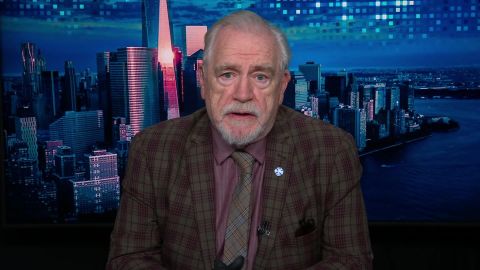Read Transcript EXPAND
CHRISTIANE AMANPOUR: Perhaps some of the actors, perhaps some of those who can weather the financial storm, maybe more fortunate than those who obviously can’t, and you mentioned the stagehands. One of the main Broadway directors has told us that it’s devastating. A quick example, almost 95 percent of all stagehands have been laid off across the United States, over 100,000 people. So, from what you know, not just as an actor but as a director as well, do you think Broadway or the West End can recover?
COX: Oh, I’m sure we can recover. I know we can recover, because as soon as this virus starts to abate, people will be going back to the theater, and we will want to serve those people again. It’s a hiatus. It’s — who knows how long the hiatus is going to last? But we have to be real about it. We have to understand the dangers. That’s why I’m in this — I’m about to enter a state of self-isolation with my family. And that’s the necessary thing. It’s the one thing that we can do. And I — it’s terrible. It’s terrible how much that is being lost by particularly the stagehands. That’s a shocking statistic, but it’s a real statistic, and there’s very little one can do about it. You either have your health or not. And I think it’s important that we try and maintain our health. But, as I say, I’m an optimist, so I know that it will pass, it’ll come. I don’t know when it’ll pass. But the people will want to go back to the theater, and the theater will be there. And those stagehands will be ready to work again. It’s just we have to do all that we can to protect these people, to make sure that they don’t get to a point of where they can’t pay their rent or they’re in starvation point.
AMANPOUR: How do you propose that? Because a lot of the — certainly, in Britain, are very concerned. I will just read you a little quote, very, very concerned. The artistic director of HighTide, which is a major U.K. theater producer, has tweeted that theaters across the U.K., “Please make it as clear as possible in your announcements that cancellations and closures are a direct response to the prime minister’s statement. The government’s evasion of direct enforcement appears to be squarely aimed at reducing odds of insurance.”
COX: I don’t quite understand what that means.
AMANPOUR: Well, I guess it means that, unless you’re ordered to close, which they haven’t been ordered to close, they have been encouraged, that the theaters don’t get insurance, and the people who put them on are not insured, and the workers are not protected.
COX: Yes.
AMANPOUR: So, I just wonder what you think. You said we must do our best to protect people and the stagehands…
(CROSSTALK)
COX: Yes. Well, I think we have to be more emphatic about that, and we have to really make the thing in force, as they have done here in the States.
About This Episode EXPAND
George Osborne, former UK Chancellor of the Exchequer, explains the state of affairs in London amidst the coronavirus pandemic. Dr. David Ho tells Walter Isaacson about his work to develop a treatment for the virus. Richard Ratcliffe discusses his wife’s temporary release from an Iranian prison. Actor Brian Cox discusses the impact of the pandemic on theatre and the arts.
LEARN MORE



